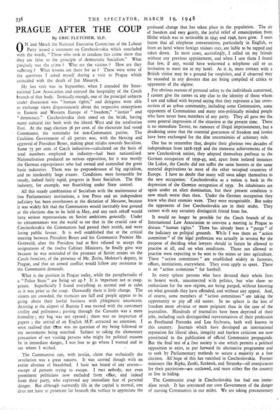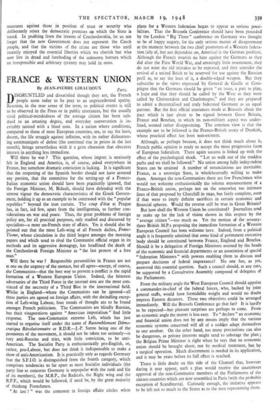PRAGUE AFTER THE COUP
By ERIC FLETCHER, M.P.
N znd March the National Executive Committee of the Labour Party issued a statement on Czechoslovakia which concluded with the words, " Those who seek to condone this crime show that they are false to the principle of democratic Socialism." What precisely was the crime ? Who are the victims ? How are they suffering ? What lessons are there for us ? These were some of the questions I asked myself during a visit to Prague which coincided with the death of Jan Masaryk.
My last visit was in September, when I attended the Inter- national Law Association and enjoyed the hospitality of the Czech branch of that body. Ironically enough, one of the principal subjects under discussion was " human rights," and delegates were able to exchange views dispassionately about the respective conceptions in Eastern and Western Europe of " freedom," " justice" and " democracy." Czechoslovakia then stood on the brink, having many cultural ties both with the liberal West and the totalitarian East. At the 1945 election 38 per cent. of the electorate had voted Communist, the remainder for non-Communist parties. The Coalition Government of all parties was, with the blessing and approval of President Benes, making great strides towards Socialism. Some 75 per cent. of Czech industries—calculated on the basis of total numbers employed in industry—had been nationalised. Nationalisation produced no serious opposition, for it was mostly the German expropriators who had owned and controlled the great basic industries. There was no preponderance of big capitalism, and no intolerably large estates. Conditions were favourable for steady, indeed fairly rapid, progress in State Socialism. The film industry, for example, was flourishing under State control.
All this steady combination of Socialism with the maintenance of free Parliamentary institutions, a free Press and an independent judiciary has been overthrown at the 'dictation of Moscow, because it was widely felt that the Communists would inevitably lose ground at the elections due to be held in May, and any such rebuff would have serious repercussions on Soviet ambitions generally. Under no circumstances was the world to see that in the crucial case of Czechoslovakia the Communists had passed their zenith, and were losing public favour. It is well established that at the critical meeting between President Benes and his Communist Premier Mr. Gottwald, after the President had at first refused to accept the resignations of the twelve Cabinet Ministers, he finally gave way because he was reminded of the presence of Soviet armies on the Czech frontiers, of the presence of Mr. Zorin, Molotov's deputy, in Prague, and that an armed conflict would follow any resistance to the Communist demands.
What is the position in Prague today, while the paraphernalia of a " Police State " are being set up ? It is important not to exag- gerate. Superficially I found everything as normal and as calm as it was prior to the coup. Outwardly there is little change. The streets are crowded, the tramcars are full and people appear to be going about their lawful business with phlegmatic unconcern. Arriving at the airport of Ruzyne I was treated with the customary civility and politeness ; passing through the Customs was a mere formality ; my bag was not opened ; there was no inspection of papers ; the arrival of an English M.P. attracted no attention. I soon realised that there was no question of my being followed or my movements being watched. Subject to taking the elementary precaution of not visiting persons who might for political reasons be in immediate danger, I was free to go where I wanted and to see whom I wished.
The Communists can, with justice, claim that technically the revolution was a great success. It' was carried though with an entire absence of bloodshed. I have not heard of any arrests— except of persons trying to escape. I met nobody, not even prominent politicians now excluded from office, and indeed from their party, who expressed any immediate fear of personal danger. But although outwardly life in the capital is normal, one does not have to penetrate far beneath the surface to appreciate the profound change that has taken place in the population. The air of freedom and easy gaiety, the joyful relief of emancipation from Hitler which was so noticeable in 1945 and 1946, have gone. I soon learnt that all telephone conversations, particularly in English, or from an hotel where foreign visitors stay, are liable to be tapped and taken down. In most cases, accordingly, I called on my friends without any previous appointment, and when I saw them I found that few, if any, would have welcomed a telephone call or an invitation to meet me at my hotel. As it . is, mere contact with a British visitor may be a ground for suspicion, and if observed may be recorded in any dossiers that are being compiled of critics or opponents of the regime.
For obvious reasons' of personal safety to the individuals concerned, I cannot give the names or any clue to the identity of those whom I saw and talked with beyond saying that they represent a fair MOSS- section of an urban community, including some Communists, some opponents of Communism and many non-politically minded people who have never been members of any party. They all gave me the same general impression of the situation at the present time. There is no immediate Terror, no rumours of illegal imprisonments, but a deadening sense that the essential guarantees of freedom and justice have been exchanged for the dire uncertainties of arbitrary rule.
One has to remember that, despite their glorious two decades of independence from 1918-1938 and the immense achievements of the new Czechoslovak nation, they adapted themselves perforce to the German occupation of 1939-45, and, apart from isolated instances like Lidice, the Czechs did not suffer the same horrors or the same material deprivations 4its most of the other occupied countries of Europe. I have no doubt that many will soon adapt themselves to the new occupation.' Czechoslovakia as a nation is back in the depression of the German occupation of 1939. Its inhabitants are again under an alien domination, but their present condition is now much worse than then. Under the German occupation they knew who their enemies were. They were recognisable. But today the opponents of free Czechoslovakia are in their midst. They cannot with any certainty distinguish friend from foe.
It would no longer be possible for the Czech branch of the International Law Association to convene a meeting in Prague to discuss "human rights." There has already been a " purge " of the judiciary on political grounds. While I was there an " action committee " of the legal profession was actually in session for the purpose of deciding what lawyers should in future be allowed to practise at all, and on what conditions. Those not allowed to practise were expecting to be sent to the mines or into agriculture. These " action committees " are established widely in factories, offices, institutions, everywhere. They even apply to sport. There is an " action committee " for football.
In every sphere persons who have devoted their whole lives to honest work, unconnected with politics, but who show no enthusiasm for the new regime, are being purged, without knowing on what grounds they have offended, and without any appeal. And, of course, some members of " action committees " are taking the opportunity to pay off old scores. In no sphere is the loss of freedom more obvious or more poignant than in the case of the journalists. Hundreds of journalists have been deprived of their jobs, including such distinguished representatives of their profession as Ferdinand Perontka and Leo Sychrava, both well known in this country. Journals which have developed an international reputation for liberal ideas, integrity and fearless criticism are now prostituted to the publication of official Communist propaganda. But the final test of .:& free society is one which permits a political opposition to exist, to put forward its alternative programme and to seek by Parliamentary methods to secure a majority at a free election. All hope of this has vanished in Czechoslovakia. Former ministers like Ripka, Zenkl, Scramek, and Stransky—all conspicuous for their patriotism—are outlawed, and must either flee the country or live in hiding.
The Communist coup in Czechoslovakia has had one imme- diate result. It has convinced our own Government of the danger of nursing Communists in our midst. We are taking precautionary
measures against those in position of trust or security who deliberately reject the democratic premises on which the State is based. In profiting from the lessons of Czechoslovakia, let us not forget that the new Government does not represent the Czech people, and that the victims of the crime are those who until recently enjoyed the essential liberties which we cherish but who now live in dread and foreboding of the unknown horrors which an irresponsible and arbitrary tyranny may hold in store.































 Previous page
Previous page